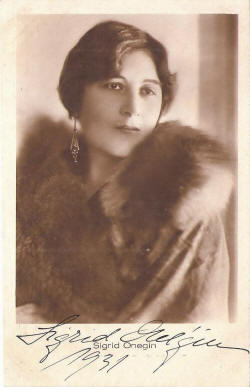 Sigrid Onégin (June 1, 1889 – June 16, 1943) was a Franco-German
operatic contralto
who enjoyed a major international career prior to World War II.
Sigrid Onégin (June 1, 1889 – June 16, 1943) was a Franco-German
operatic contralto
who enjoyed a major international career prior to World War II. Partner Agnes Elisabeth Overbeck
Queer Places:
Waldfriedhof Stuttgart
Stuttgart, Stadtkreis Stuttgart, Baden-Württemberg, Germany
 Sigrid Onégin (June 1, 1889 – June 16, 1943) was a Franco-German
operatic contralto
who enjoyed a major international career prior to World War II.
Sigrid Onégin (June 1, 1889 – June 16, 1943) was a Franco-German
operatic contralto
who enjoyed a major international career prior to World War II.
She was born in Stockholm, Sweden, in 1889 to a German father and a French mother. This renowned contralto first sang professionally under her maiden name, Lilly Hoffmann. After her marriage to Russian pianist and composer Eugene Onégin (1870–1919) (real name Agnes Elisabeth Overbeck), she sang briefly as Lilly Hoffmann-Onégin before settling on Sigrid Onegin, the name by which she became famous.
She studied in Frankfurt, Munich, and Milan, and also took lessons from famous singers of an earlier generation in Lilli Lehmann and Margarethe Siems. Her operatic debut occurred at Stuttgart in October 1912, where she appeared as Carmen.[1] She joined the Stuttgart Opera in 1912 and the Munich Opera in 1919.
Agnes Elisabeth Overbeck was responsible for the vocal training of Sigrid Onégin. Overbeck accompanied her at the same time during piano performances. She had discovered Hoffmann during an audition at the Spangenberg Conservatory, the forerunner of today's Wiesbaden Music Academy. The two entered into a relationship - "the unequal couple, the almost stately seventeen-year-old, who almost towers over the nine year older one by the main length, and the dainty, almost overly tender companions... She knew that people were surprised that she, who had beaten out so many clients, now felt attached to a man... Even though Lilly had a tender love for children from an early age... she was not allowed to think of herself now."[1] On 25 January 1913, Overbeck married Lilly Hoffmann in London under the name Baron Onégin.[5] Hoffmann's mother had "not yet overcome her aversion to him... Here there was only one solution to withdraw the girl from her mother's will... Without informing her mother, they leave, are secretly married in London."[6] From 1912 until her death in 1919 she lived with Hoffmann in Stuttgart, where she had an engagement at the opera and now appeared under the name Sigrid Onégin. During the First World War, Overbeck had to hide as an alleged "Russian man" from the authorities until "he" was denounced and arrested in 1916. Sigrid Onégin was supposedly released because of her influence.[7] What is preserved of them is a recording of the Ave Maria, composed by Overbeck and sung by Sigrid Onégin. Overbeck died in 1919 in Stuttgart at age 49. In 1920 Onégin married the physician Fritz Penzoldt (1887–1959).
In the 1920s, Sigrid Onégin spent two seasons at the Metropolitan Opera and one at Covent Garden, singing Amneris (Aida) as well as a variety of Wagnerian roles. In the 1930s, she sang at Salzburg and Bayreuth Festival, but she was most widely sought after for her concert performances.
Onegin is said to have possessed the finest contralto voice heard since Ernestine Schumann-Heink, who had been a star of opera's so-called "Golden Age" (the period between the 1880s and World War I). Onegin's singing was celebrated for the richness of its tone, its flexibility, its size, and its expert coloratura technique.[2] She also possessed a remarkably wide vocal range.
Her last concert appearance came in the United States in 1938. She died at Magliaso, in neutral Switzerland in 1943, while the Second World War was raging at its height. She made a number of impressive 78-rpm recordings during the years of her prime which have been re-issued on CD.
My published books: